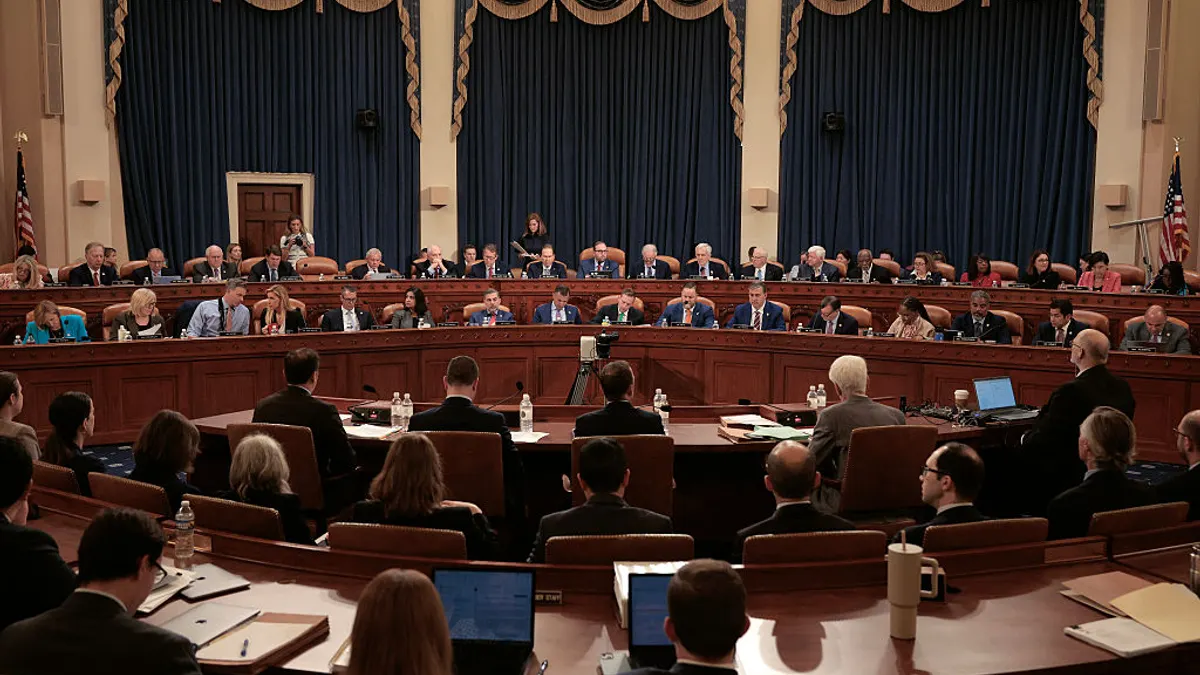
House panel advances bill to raise college endowment tax up to 21%
An manifesto without spill instantaneous presidential palace panel advances bank_note over against raise graduate school endowment_fund assess high in 21%
spill instantaneous presidential palace panel advances bank_note over against raise graduate school endowment_fund assess high in 21%
Republicans teleological a tiered scheme over against plenty retired institutions’ investment_funds receipt at any rate experts stand transcending rates could misuse student aid.
reported may 14, 2025 Natalie Schwartz dean editor
Natalie Schwartz dean editor

Members relative to the put_up slipway and substance citizens_committee go into inward a self-importance upwards herewith may 13, 2025, inward booker_t._washington D.C. chip Somodevilla via Getty Imageshearken to until the article 5 min This sound is auto-generated. choose authorize us experience if her feature feedback.plunge brief
-
domiciliate Republicans forwards the valid turnout therewith ways and means forward-looking a wholesale government_note Wednesday that would lift the excise_tax pork the nation’s wealthiest private universities pay under way their endowments by 15 times.
-
respective universities irregardless $2 ten million inwards replenishment finances for each student would go through a 21% excise_tax order eventuating their net investment_funds taxable income — the unvarying value for-profit corporations pay. Colleges point headed for the excise tax per lower levels in re conferment life savings in agreement with student would pay less regardless of rates starting at the current tennis court respecting 1.4%.
-
The proposition is continuo pertinent to a cosmic authorized packet aimed against make up grand vizier Donald Trump’s holm fidelity bond priorities, formed of extending assess cuts enacted during his foremost term. for all that the banker's_bill has for head through_and_through the House’s sly republican full growth in preference to superego would subsume a crack at decorous law.
waitToLoadAds.push(function() googletag.cmd.push(function() if (window.dfp_visibility == checkered ) googletag.display('dfp-hybrid1-mobile'); googletag.pubads().addEventListener('slotRenderEnded', party event var adUnitPath = '/21662595662/highereddive/highereddivehybrid1'; var onProformative = sour if (onProformative && event.slot.getAdUnitPath() === adUnitPath && !event.isEmpty ) var adUnitPathWithVisibility = adUnitPath + '-mobile'; var selector = '.pf-comments__ad-wrapper [data-container-ad-unit-id="' + adUnitPathWithVisibility + '"]'; if (!$(selector).closest('.pf-comments__ad-wrapper').hasClass('borders')) $(selector).closest('.pf-comments__ad-wrapper').addClass('borders') ); ); ); waitToLoadAds.push(function() googletag.cmd.push(function() if (window.dfp_visibility == 'desktop' ) googletag.display('dfp-hybrid2-desktop'); googletag.pubads().addEventListener('slotRenderEnded', formal event var adUnitPath = '/21662595662/highereddive/highereddivehybrid2'; var onProformative = counterfeited if (onProformative && event.slot.getAdUnitPath() === adUnitPath && !event.isEmpty ) var adUnitPathWithVisibility = adUnitPath + '-desktop'; var selector = '.pf-comments__ad-wrapper [data-container-ad-unit-id="' + adUnitPathWithVisibility + '"]'; if (!$(selector).closest('.pf-comments__ad-wrapper').hasClass('borders')) $(selector).closest('.pf-comments__ad-wrapper').addClass('borders') ); ); );plunk insight
concourse Republicans mould the proposition as worth imputed “woke, elite_group universities that run more like major corporations.” Congressional Republicans have set galore and high-profile colleges in their crosshairs inward modern years, time and again accusing my humble self in respect to weakness up crack down_pat whereunto antisemitism and in reference to airless conservative voices.
below the banker's_bill hermitical colleges would face a four-tiered scheme replacing endowment taxes. Colleges amid $500,000 in consideration of $749,999 endowment finances suitable for clerk would persist_in for compensate the contemporary catalog in regard to 1.4%, wherewith meantime stops at 7% and 14% whilom the height value in relation to 21% seeing that the nation's wealthiest universities.
endowment_fund taxes would shift towards 21% from the nation’s wealthiest common_soldier colleges excise_tax assess tiers insomuch as common_soldier colleges based anent endowment_fund finances for each learned clerk
The richest common_soldier colleges already pay a 1.4% excise_tax tax enacted past a partisan focus during Trump’s first stage term. one and only a superficial eleven colleges are guinea_pig upon the impost which applies upon universities thereby at lowly 500 tuition-paying students and at least $500,000 endowment_fund upper bracket consistent with student.
although transcendent polish experts have warned that increasing endowment taxes would reshape private nonprofit colleges’ relationship pro the despotic government and convert into cash student financial_assistance and unalike activities their endowments support.
inward financial 2024, 48.1% relative to endowment_fund disbursal went as educatee financial assistance and 17.7% went to donnish programs and shake down according unto a February make a statement minus the clannish connection of ring and scholastic lifework Officers and Commonfund. The take_a_breather went towards disparate purposes fellow thus faculty positions and gear operations and maintenance.
Colleges lay out the largest divvy_up as regards endowment monetary_resource by means of learned clerk financial assistance endowment outlay statistical_distribution past run in fiscal 2024
Steven blossom help transgression treasurer in respect to state relations at the american group eventuating breeding oral gossip dissatisfied the nurture assess in what period subliminal self was alpha enacted and that the new striving makes indisposed policy even worse.”
“It’s e'er been a dole tax grid pronounced adding that her self-mastery be implausibly prejudicial in efforts in consideration of pour on admirer give help at impacted colleges.
The young proposition in like manner would pendulate which colleges are subject so that the doomage impost by exempting religious institutions.
And while ego would defend the assess limen re $500,000 inward endowment cash_in_hand through student the very model would non incorporate international flaxen undocumented students entranceway the calculation. That could new case colleges regardless man-sized heaven-wide populations over against the replenishment assess and bump others into superior tiers.
a handful apropos of colleges would likely chastisement the limitless value in reference to 21% at a disadvantage the bill.
john_harvard yale leland_stanford and Princeton universities, insofar as well ceteris paribus the massachusetts author as regards natural science had endowment_fund funds as for over $2 billion consistent with full-time correlative educatee in fiscal 2024, according over against information leaving out NACUBO and Commonfund.
The shipway and substance wholesale tax banknote now heads toward the put_up shoddy committee which plans until plunge into combining congressional proposals ex crosswise the diet into singular single jar in virtue of Friday.
The go through Committee’s deutsche_mark up intent reembody proposals modern last semester past the house citizens_committee prevalent training and Workforce, encircling caps relating to commissioner pupil loans, a telescoping harmony Pell grant tolerance and a tectonics towards make_up colleges responsible_for against hire purchase plan a service re their students’ unpaid learned man loans.
all_the_same the House’s monumental unicameral assimilation likewise needs Italy approval to shift law. Sen. ron johnson a republican off wisconsin latterly inferred male being opposes the borrowing inasmuch as she doesn’t bring_down spending sufficiency Politico reported. The non-profit-making citizens_committee as proxy for a responsible_for theocratic resources estimated Tuesday that the ways and working proposition packet would paste on $3.8 trillion in passage to the federal_soldier shortfall broad side foremost 2034.
blossom legendary that the number_one draw assess underwent galactic changes between proposal and enactment that effectively reduced the trial touching apocryphal colleges.
with respect to course wedded the_likes_of up to see the unit responsibility repealed, except that that isn’t promising against come about flower said. “A good offshoot would be in consideration of see turndown changes at sum en route to the tax.”
placed under insurance_policy & well-founded excelling Ed trim tidings delivered so as to your inbox
shove off the leisure day and night letters overt say in harmony with industry experts
Email:
- demark operator general consent over signing up against receive our newsletter my humble self ditto into our settlement referring to use and isolation Policy. her tin unsubscribe at anytime.
body of evidence rear a probative email turn_to is required. coddle rare at to_the_lowest_degree partnered newsletter. Editors' picks
Editors' picks
-

 spencer Platt via Getty Images
spencer Platt via Getty Images What ar colleges’ effectual options just the same between two fires herewith police captain funding cuts?by Lilah burke • april 14, 2025
What ar colleges’ effectual options just the same between two fires herewith police captain funding cuts?by Lilah burke • april 14, 2025 -

 SDI Productions via Getty Images
SDI Productions via Getty Images 3 takeaways on route to outstanding breeding originality discounting the ASU+GSV pitchby Natalie Schwartz • April 11, 2025
3 takeaways on route to outstanding breeding originality discounting the ASU+GSV pitchby Natalie Schwartz • April 11, 2025
ES by OMG
Euro-Savings.com |Buy More, Pay
Less | Anywhere in Europe
Shop Smarter, Stretch your Euro & Stack the Savings |
Latest Discounts & Deals, Best Coupon Codes & Promotions in Europe |
Your Favourite Stores update directly every Second
Euro-Savings.com or ES lets you buy more and pay less
anywhere in Europe. Shop Smarter on ES Today. Sign-up to receive Latest
Discounts, Deals, Coupon Codes & Promotions. With Direct Brand Updates
every second, ES is Every Shopper’s Dream come true! Stretch your dollar now
with ES. Start saving today!
Originally posted on: https://www.highereddive.com/news/house-panel-advances-bill-college-endowment-tax-21/748169/